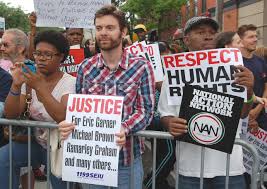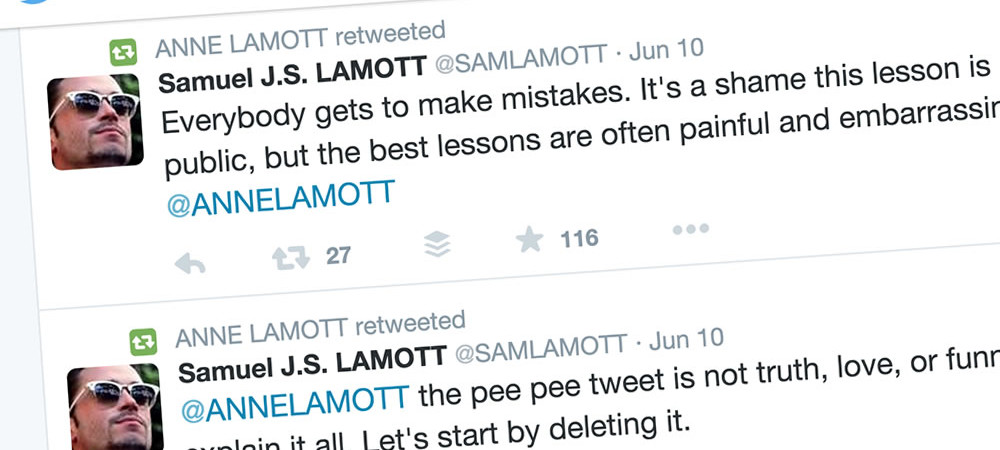Notes to a white religious leader
July 3, 2015Notes to a white religious leader in a majority white denomination preparing to give a #BlackLivesMatter sermon:
- Nurture the hearts and souls of the congregation . . . to be able to look at the racist institutional and cultural violence that is burning all around us. To acknowledge the despair, the pain, the heartbreak, and to collectively grieve – to assume that everyone there, on some level, is grieving and to invite them into that space, rather then assume they are indifferent and uncaring, even if potentially one could assume them outwardly from their actions/inaction. We are not there to pass judgement on who we think are, but to create support for who people want to be, who we know they can be, who these times call on our people to be.
Anne Lamott and the Pee-Pee Tweet
June 13, 2015OK, honey, you know we love you, right? We love your novels and your essays and your memoirs and your wonderful Facebook posts. We love that you see your own imperfections, which look so much like ours, and that you are so clear that God treasures each of us in the presence of those imperfections, not in spite of them. Read more →
Music to Sustain a Movement: Tending to the Grief, Rage, and Love
April 29, 2015A playlist vigil as we mourn black lives lost and racism unchecked. Read more →
A Woman of Courage: Frances Ellen Watkins Harper
March 19, 2015In the city of Philadelphia, Pennsylvania, in the year 1858, a young woman entered a streetcar and sat down. The conductor came to her and insisted she leave, but she stayed quietly in her seat. A passenger intervened, asking if the woman in question might be permitted to sit in a corner. She did not move. When she reached her destination, the woman got up and tried to pay the fare, but the conductor refused to take her money. She threw it down on the floor and left.
What was that all about? Read more →
Breathe: A Poem
December 23, 2014
How can I breathe at a time like this,
when the air is full of the smoke
of burning tires, burning lives?
Just breathe, the wind insisted.
Easy for you to say, if the weight of injustice
is not wrapped around your throat,
cutting off all air.
I need you to breathe.
I need you to breathe.
Don’t tell me to be calm
when there are so many reasons
to be angry, so much cause for despair!
I didn’t say to be calm, said the wind,
I said to breathe.
We’re going to need a lot of air
to make this hurricane together.
by Lynn Ungar
12/4/14
www.lynnungar.com
Read more: http://www.patheos.com/blogs/uucollective/2014/12/breathe-a-poem/#ixzz3MkFuxZzd
Seeing is Believing
December 12, 2014In the wake of Ferguson, in the wake of Trayvon Martin and Oscar Grant and the 12-year-old boy with a pellet gun who was recently shot by a police officer in Cleveland and all the other young Black men killed because a White man found them threatening, it’s hard to know what to say. It’s hard to know what to say to my Black teenage daughter as we take the long way home from downtown Oakland to avoid protests that have started to turn violent. It’s hard to know what to say to Black friends who are grieving publicly on Facebook, who feel assaulted once again by a system which has betrayed them over and over. And it’s hard to know what to say to a good, kind-hearted White friend who feels that her police officer son is being defamed by complaints against the police, and says that we all experience racism, and that we should just all be nice to one another.
kind-hearted White friend who feels that her police officer son is being defamed by complaints against the police, and says that we all experience racism, and that we should just all be nice to one another.
It’s hard to know what to say, and it’s hard not be impatient with people who seem hopelessly out of touch. I have to start by remembering that we all speak from what we know, what we experience, what we see. We speak as eye-witnesses to our own lives. Which means that for a lot of White people, racism doesn’t really exist, or exists only as a few isolated instances. After all, what most of us who are White see in our daily lives is that the police are there to keep us safe. What we see is that our walking down the street or driving a car is not a subject for police investigation. What we see is that the folks who turn to look at us in stores are wondering if we need help. That’s reality.
And if that’s your reality then rage against the police seems misplaced, unreasonable, unjustified. If the justice system has always looked to you like, well, justice, then protesters on the streets are threats to the public safety, not advocates pushing for public safety. We know what we see. Who we imagine the public to be are the people who look or dress or talk like us.
I suspect that everyone who drives has been in the position of wanting to tell off the idiot who has come to a complete stop in the middle of the street in front of us. Maybe we honk our horn, or just sit there grumbling about the rude, clueless twit blocking our way for no reason—until we finally see the pedestrian crossing past the vehicle that was blocking our view. It turns out that the driver in front of us could see something that we couldn’t, was acting on information that we didn’t have.
It isn’t easy. The folks with the privilege have every habit of assuming what they see is the “real world,” and every incentive to stay in that comfortable world. The tricky part is that it’s really the job of the White people to help other White people see around the corner. There are many terrific books and blog posts and articles by people of color about their experiences, and White folks would do well to read them. But ultimately it is the responsibility of the White people who’ve caught a glimpse of the pedestrian in the road to help other White people see what is beyond their field of vision. Even when it’s uncomfortable. Even when you don’t quite know how to do it. Even when you’re pointing toward something that’s not altogether clear to you.
Maybe it’s enough to just ask everyone to enter the conversation aware that the fact that you don’t see something doesn’t mean it isn’t there.
On Going to Church (Excerpt)
September 1, 2013Podcast: Download (2.5MB)
Subscribe: More
I come to church—and would whether I was a preacher or not—because I fall below my own standards and need to be constantly brought back to them. It is not enough that I should think about the world and its problems at the level of a newspaper report or a magazine discussion. I must have my conscience sharpened—sharpened until it goads me to the most thorough and responsible thinking of which I am capable.
All Our Relations
September 1, 2013Podcast: Download (5.2MB)
Subscribe: More
 Community has been lost in today’s world. People have become so engrossed in their own wants, dreams and desires that they don’t worry about helping anyone else. One of the truest definitions of community is fellowship, and we can’t have fellowship going about life on our own.
Community has been lost in today’s world. People have become so engrossed in their own wants, dreams and desires that they don’t worry about helping anyone else. One of the truest definitions of community is fellowship, and we can’t have fellowship going about life on our own.
Amongst Native culture, the importance of community is prevalent throughout their history. This becomes evident as you learn of the many different Native customs and beliefs, yet come across one common expression in nearly all Native nations and tribes. For the Lakota people the expression is Mitakuye O’yasin, for the Cherokee it is Ahwensa Unhili, and in English it translates to All Our Relations.
Who Knows You?
September 1, 2013Podcast: Download (2.8MB)
Subscribe: More
Some of the old New England graveyards are serene little pockets of neglect. Their slate tombstones lean at odd angles and the elegant calligraphy is barely legible, spelling out obscure colonial names like Ozias and Zebulon. Some of the inscriptions that can still be deciphered tell poignant stories of sons and husbands fallen in long-ago wars and young wives lost in childbirth.
Clusters of brick-sized stones mark the deaths of children in some catastrophic winter. The engraved cries of lament—“Farewell, Beloved Daughter”—evoke a tug of grief even now, though the people named have been dust and earth for two hundred years or more.
From Your Minister
September 1, 2013Podcast: Download (5.6MB)
Subscribe: More
By now, I have been part of too many communities to name—and I’ll bet you have too!
Though the extended community of Unitarian Universalists is a profoundly important one for me, if I had to name where I’ve learned the most about how to create deep and grounded community, it would not be church of any kind.
Renew Your Membership
We invite you to join your fellow CLFers to renew your CLF membership and stewardship of the CLF for another year.
Support the CLF
Can you give $5 or more to sustain the ministries of the Church of the Larger Fellowship?
Newsletter Signup
About
Quest for Meaning is a program of the Church of the Larger Fellowship (CLF).
As a Unitarian Universalist congregation with no geographical boundary, the CLF creates global spiritual community, rooted in profound love, which cultivates wonder, imagination, and the courage to act.
Contact
Church of the Larger Fellowship Unitarian Universalist (CLFUU)
24 Farnsworth Street
Boston MA 02210




